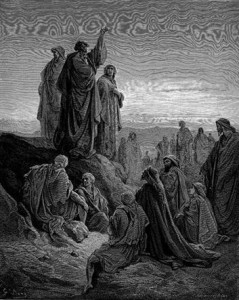Acts 5:27-32
This text is used for the Lectionary Year C on April 3, 2016.

Acts 5:27-32 is part of a larger story that unfolds in Acts 5:12-42. The narrative summarizes the apostles’ work in Jerusalem which leads to their arrest. During the night, an angel of the Lord releases the apostles, sending them back to the temple to continue proclaiming the gospel message. Ever faithful, they return at daybreak, jump right back into preaching, and are arrested once again. This time the apostles are brought before the high priest and Sanhedrin. Today’s passage comprises the accusations of the high priest against them and the apostles’ bold response to the charges. The context alone sets up a possible focus for preaching. The apostles preach the gospel, encounter imprisonment, are miraculously released, and immediately get back to preaching the gospel – in the exact same place their message seemed to fail the first time!
How often are we eager to shake the dust off our feet when opposition to our faithfulness arises? There is a time for counting our losses and moving on, but the preacher might want to consider encouraging the call to return to hard places, to keep at the work of faithfulness, and to proclaim the good news again regardless of the results we see. Twice the apostles preached in the temple. Twice they were arrested. Once they were flogged. And yet, Acts 5 concludes with the apostles rejoicing in their sufferings and preaching in the temple every single day. Too often, discouragement and indifference creep in, and we cease to proclaim the gospel. There is a great witness that comes from those who keep at it. This may be a week of picking up the apostles’ torch and keeping at it!
The preacher may also want to emphasize the themes of God’s sovereignty in response to Christian suffering. In just six verses, we are reminded of Jesus’ death and resurrection, and invited onto the path of opposition and joy that inevitably finds those who follow him. Neither the Savior nor his followers are spared from suffering. Nor does suffering get the final say in any of their lives. The Savior’s death leads to the forgiveness of all of Israel. The apostles’ imprisonment and flogging leads to rejoicing and a greater message to proclaim. The preacher will encourage those in the midst of suffering to take courage and hold on, knowing that suffering never has the final say when Jesus Christ is Savior. He or she will offer a strong word of hope, reflecting on the Sovereign God who has always used what was meant for evil for good.
This text also lends itself to an ongoing challenge for the church, that is the call to obey God rather than human initiative. What does this mean for a church absorbed in the secular and religious norms of the 21st century? What does our society say leads to success, value, and worth? What does our culture suggest every one is entitled to, and how does this entitlement sneak into the church? How does this call to obey God rather than human authority translate into a society that supports religious freedom and the separation of church and state? Is the apostles’ bold statement in verse 29 misused when Christians demand the Ten Commandments remain on the courthouse lawn? Or how about when Christian coaches take on school boards over the issue of leading players in prayer before a game? They claim they are obeying God rather than human authority, but are they helping the gospel move forth unhindered?
This unhindered Spirit is the theme at the heart of Acts. It is not primarily about Christian rights and power over authorities, but rather, about a Spirit and a gospel that cannot be contained. How might we see the gospel move forth with power and authority in today’s society? Would it be by making a strong statement against human authority? Or would it be more counter-cultural to love our leaders well and genuinely seek the welfare of our cities? Perhaps there is room for both!
In the end, there is no substitute for proclaiming the word. When the Holy Spirit takes hold, stirring up obedience and joy in the followers of Christ, there will be opposition. The fact that so few of us face opposition in a culture steeped in the values of choice and liberty for all has led some Christians to stir up their own controversies. These rarely enhance the spread of the gospel message among nonbelievers. Those who seek to genuinely love the myriad of folks that arise out of a choice-driven, liberty-loving culture, however, seem to know opposition all too well. And in their feeble attempts to love all with the love of Christ, the gospel message does indeed seem to spread.
Finally, the boldness of the apostles should find its voice today first and foremost in the pulpit. The preacher’s greatest censor is not the high priest or Roman court but the head elder, finance committee chair, or that deacon with a constant word of critique on his lips. Those who are called to preach the message must be the first to embrace Peter’s call to obey God rather than human authority and expectations. People come to church longing to hear a word of truth. They come desperate to know there is another story being told in this world. When we open Scripture and proclaim, “The Word of God for the people of God,” we are inviting the church to experience a deep truth with us, a truth that has the power to transform. This text may be less about what to preach and more about how to preach. May you step into the pulpit with boldness but careful not to wound. May you step into the pulpit with a word of truth to proclaim, but may you proclaim it with love and humility. May you step into the pulpit rejoicing, even when you’re not sure why you are at this again, remembering that our sovereign God has called you. May you walk into the pulpit determined to proclaim and proclaim again, even to the same folks who seemed distracted and unchanged the week before, knowing that our faithfulness invites the Spirit to move forth unhindered.
 Jamie McCallum
Jamie McCallum
Pastor
Belfair Community Church, Belfair, Washington
jamie@belfairchurch.com
Tags: opposition, boldness, human authority, sovereignty
